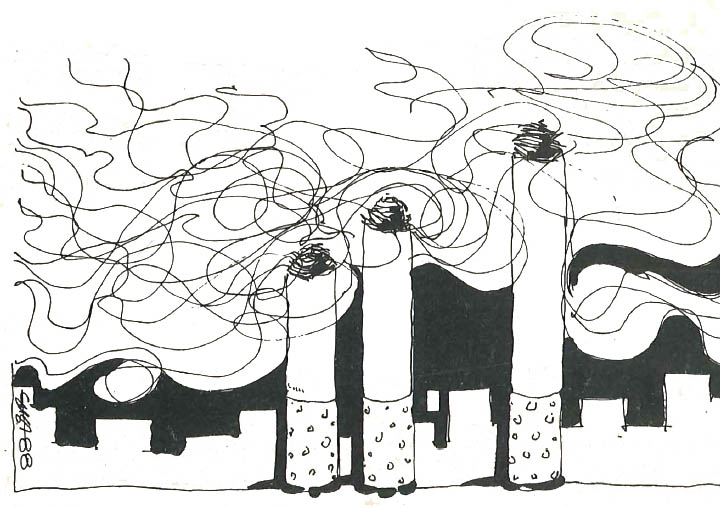
Littie do they know that the buses and taxis emitting black clouds (like the smokescreen laid down by a destroyer to protect the flagship) and the factories.
which cannot help pouring their emissions into the blue sky and. turning it yellow, account for only ten percent of the Athenian smog: the remaining 90 percent, according to Professor Ekopsa Totsigarro, is composed entirely of cigarette smoke.

The professor is a leading member of the Greek Anti-Smoking Association (GAS) and he came to his conclusion after carrying out extensive tests on air samples collected from the four corners of the area enclosed by Mounts Parnes, Penteli, Hymettus and the sea.
Dr Totsigaro is chairman of the Chemistry Department of the University of Ano Liossia and he was good enough to spare five minutes of his valuable time to grant me an interview at three o’clock on a Tuesday afternoon – an unusual time by Greek standards, which made me all the more appreciative of his kindness, particularly as we were interrupted by phone calls several times during the interview which he would . answer with the reassuring phrase in Greek: “Yes, my golden one, I shall be with you in a little while. Do not fret. Little kisses.”
“My tests were very revealing” he said to me, “ten percent Mobil, BP, Mamidakis, Eko, Texaco and Shell and 90 percent Keranis, Papastratos, Rothmans, Winston, Marlboro, Players, Silk Cut and what-have-you. There was also a certain percentage of methane gas but that was only on the days when Greeks traditionally eat their bean soup.”
“I see you are a member of the Greek Anti-Smoking Association,” I said, noting the badge on his lapel which looked like a skull and crossbones except that the crossbones consisted of two crossed cigarettes.
“Yes, I am. But there is very little we can do. You will recall th.at during last month there was a world no-smoking campaign and that a half-hearted series of commercials appeared on Greek television?”
“Indeed, I do. And if I am not mistaken, one of them showed a pair of smoker’s lungs side by side with a pair of non-smoker’s lungs.”
The professor nodded. “How did that strike you?”
“Well,” I confessed, “the healthy lungs looked just as revolting as the diseased ones.”
“True, true,” the professor agreed.
“Only cats like lungs. I prefer liver myself. But I digress. You will recall also that there was a round table discussion on TV with Dr Doxiades, who was minister of health under a previous government, and the current minister of health.”
“I caught that,” I said, “and I remember Dr Doxiades’ saying that for an anti-smoking campaign to be effective, it should be directed at schoolchildren aged 12 at the most, because that was the age at which they began smoking. Is that a fact?”
Dr Totsigarro shook his head.
“Earlier Greek children become passive smokers as soon as they are born since it is more than likely that both their parents are happy puffers, as are all their uncles and aunts and their grandparents.
So, since they are exposed to nicotine addiction from infancy, it would seem more logical to direct an anti-smoking campaign at babies, rather than 12-year-olds. Good grief, don’t you realize that by the age of 12 they have become so addicted to nicotine by proxy that nothing will prevent them from going out and buying their first pack of Benson and Hedges, in the gold wrapping, and a Zippo lighter, later to be replaced by a Dunhill and still later by le must from Cartier. You need more than a lousy five-second TV commercial showing a eat’s dinner to combat those status symbols.”
“What can be done, then?” I asked.
“Nothing effective, for the time being. The Greeks will go on being happy puffers because they’re extremely self-indulgent and the only power on earth that could ever get them to change their bad habits is vanity. Because in addition to being self-indulgent they are also pathetically, if not pathologically, vain. When it becomes totally unfashionable to smoke, as it will one day be in the more civilized countries of the West, then the Greeks will give it up too.”
“But this may take years,” I said.
“What happens in the meantime?
Don’t they realize they are doing appalling damage to their health, as well as causing the nefos, as your figures have established?”
Totsigarro shrugged. “They don’t care. I’ve seen doctors at the Sotiria Chest Hospital chain smoking while they discussed the survival prospects of patients with emphysema and lung cancer. And I’ve seen patients recovering from heart attacks caused by excessive smoking, surreptitiously taking a drag under the bedcovers when they thought nobody was looking.”
“So what’s to be done?” I asked hopelessly.
Totsigarro shrugged again. “It doesn’t really matter,” he said.
“Most of the present generation of Greeks will die in car crashes before they’re 50, so what the hell.”







